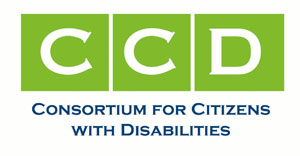CCD Applauds Senators Kennedy & Harkin for Leadership to Ensure Health Care Reform Includes Long Term Services and Supports
June 8, 2009

|
The Consortium for Citizens with Disabilities applauds Senators Kennedy and Harkin for their leadership and tireless work to ensure the inclusion of long term services and supports in health care reform.
Long-term services and supports encompass a broad range of assistance with everyday activities, such as assistance and supervision with dressing, bathing, using the bathroom, preparing meals, taking medication, managing a home, and managing money. An estimated 10 million Americans currently have needs for long-term services. As the U.S. population ages and expands, the number of individuals needing long-term services is projected to increase to 26 million by 2050. However, the nation lacks a comprehensive, proactive national public-private system for delivering long-term services and supports.
Nearly half of all funding for long-term services is provided through Medicaid which requires individuals to impoverish themselves to receive supports. There is an institutional bias within Medicaid that denies Americans an equal choice for home and community services. Hundreds of thousands of individuals with disabilities and their families are on waiting lists for Medicaid home and community-based services. There is also a crisis in the availability of direct support professionals to provide services.
Long-terms services and supports are an essential part of health care reform that cannot be ignored. These services are essential to sustaining a productive life in the community, maintaining function, preventing the development of secondary conditions, and promoting the health and well-being of Americans with disabilities and seniors. CCD believes that a two-prong approach is needed: 1) establish a new national program to finance long-term services and supports; and 2) make much needed improvements within Medicaid to strengthen long-term services and supports. The Community Living Assistance Services and Supports (CLASS) Act, introduced by Senator Kennedy (D-MA), and the Community Choice Act, introduced by Senator Harkin (D-IA), are essential pieces of the puzzle to ensuring Americans have long-term services that promote choice and independence.
The CLASS Act would establish a new national insurance program financed by voluntary payroll deductions to provide benefits to adults who become severely functionally impaired. This new system will help to preserve the Medicaid program, which currently bears the brunt of covering long-term supports and services and will not be able to sustain an aging baby boom generation. It would promote independence and dignity across the lifespan by ensuring beneficiaries the right to control and choose what services they receive, how and where they are delivered and who provides them. The Community Choice Act would improve Medicaid to provide individuals with disabilities and seniors with an equal choice of receiving home and community-based services in Medicaid. This legislation would help correct the institutional bias by requiring community-based personal attendant services and supports benefit within Medicaid.
"While approximately 45 million Americans do not have medical insurance, over 250 million Americans lack any protection for the costs of long-term services and supports. Americans should no longer have to impoverish themselves to cover the costs of services they need in the event of disability or advancing age," said Marty Ford, Chair of the Consortium for Citizens with Disabilities. "The Community Choice Act and the CLASS Act will go a long way in meeting the current and future needs of Americans for long-term services and supports. The aging and disability communities look forward to working with Senators Kennedy and Harkin to ensure health care reform meets the needs of Americans for long-term services and supports."
The Consortium for Citizens with Disabilities (CCD) is a coalition of national consumer, service provider, and professional organizations which advocate on behalf of persons with disabilities and chronic conditions and their families.
For Additional Information Contact Marty Ford or Annie Acosta: (202) 783-2229; [email protected].







